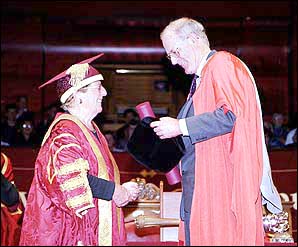Reprinted from the University of Canterbury’s “Chronicle” – 30/08/02
University Council member Judge Stephen Erber gave the oration for Justice Andrew Tipping of the Court of Appeal, who was presented for an honorary LLD at the University of Canterbury’s afternoon graduation ceremony on Wednesday April 17.
“A life in the law is not for everyone. Edward Gibbon rejected it claiming that: ‘Few men without the spur of necessity have resolution to force their way through the thorns and thickets of that gloomy labyrinth.’
‘We are fortunate that Andrew Patrick Charles Tipping was, 200 years or so later, equipped with that necessary resolution.
“He graduated from this University in 1966 BA/LLM with first-class honours – the first person to achieve a first since Sir Alec Haslam in 1926. He won the Canterbury District Law Society Gold Medal and the New Zealand Law Society Cleary Prize. He went into practice as a barrister and solicitor and became his firm’s senior common law partner. He took a full part in the governance and regulation of the legal profession and in our University Law School he tutored in the law of evidence, held the post of moderator for the New Zealand Law Schools in the law of torts and was a member of the University Council.
“In 1986 he was appointed to the High Court and sat in Christchurch. He is Chair of the Council of Legal Education and in 1997 he was appointed to the Court of Appeal. Today, he joins the other very distinguished graduates of our law school – Sir Kenneth Gresson, Sir Ivor Richardson and Sir Edward Somers – in receiving an honorary doctorate.
“In his role as a Justice of the Court of Appeal he has the opportunity to shape the laws of New Zealand – an opportunity which he has willingly embraced. There are many examples, but two relating to freedom of expression and its limits will suffice.
“In 1995, the former prime minister Mr Lange claimed to have been defamed in a magazine. At that time, it was thought that political commentators were protected from the laws of defamation by what is called the defence of qualified privilege – so long as they were not malicious, they could say what they liked. A majority of the Court of Appeal, broadly speaking, upheld that view but Justice Tipping confessed to being attracted by the argument that the defence of qualified privilege should be tempered by the requirement that commentators took reasonable care to get their facts right. The case went to the Privy Council and was returned to the Court of Appeal for further judgment in which Justice Tipping’s original views were given much more weight. Now, reasonableness is a material consideration in determining whether a claim to qualified privilege by a commentator will be upheld. A ‘cavalier approach to the truth’ will defeat the defence of qualified privilege.
“This judgement was an important step in the consideration by the Court of Appeal of the extent of the right to freedom of expression, to which theme Justice Tipping returned in the very important case of Moonen v Film and Literature Board of Review. In this case, Justice Tipping emphasised that freedom of expression as declared in the New Zealand Bill of Rights Act was not simply a piece of constitutional decoration to be taken out, admired but rarely invoked – but a right to which full weight should be given. It was a right that was, as he said, ‘as wide as human thought and imagination.’ But what was even more important than that statement was his statement that citizens may expect ‘that on appropriate occasions the courts will indicate whether a particular legislative provision is or is not justified under the New Zealand Bill of Rights Act.’ While the courts do not have the power to strike down Acts of Parliament, it is very significant that our Court of Appeal will, when the occasion demands, criticise Parliament in enacting or retaining an enactment which is inconsistent with the Bill of Rights.
“In all Justice Tipping says, there is much to admire – a good style of prose, clarity of exposition, economy of expression and, most importantly, a very reassuring air of independence, detachment and learning.
“Justice Benjamin Cardozo once said that the great problems of the law are ‘the reconciliation of the irreconcilable; the merger of antithesis and the synthesis of opposites’. The opposite poles are, of course, current human behaviour contrasted with absolute standards of right and wrong – standards good for all ages.
“The task of the judge is then to reconcile or accommodate the demands of human nature to the acceptance of timeless rules of behaviour which are at once fundamental but often seen as distant, unattainable and inconveniently immutable. The task is to reconcile law with life.
“It is as well this country and its laws has, in the Court of Appeal, persons of Justice Tipping’s exceptional calibre to engage in this task.
“Chancellor, I have the honour to present Andrew Patrick Charles Tipping for the award of the degree of Doctor of Laws (honoris causa).”
Why law?
|
|
| Justice Tipping receives his honorary LLD from the Chancellor, Dame Phyllis Guthardt. |
Justice Andrew Tipping LLD (honoris causa), gave the graduation speech at the afternoon ceremony on Wednesday April 17.
“Chancellor, Judge Erber, Vice-Chancellor, Council, members of the University, graduates, ladies and gentlemen. I would first like to thank the University for the honour it has bestowed upon me today.
“Little did I imagine when I attended my first graduation ceremony that I would in 37 years’ time be attending another such ceremony in a rather different capacity. The contrast is all the more striking when I compare these magnificent surroundings with the old barracks in Cashel Street where the ceremonies were held in the mid-’60s. The Law School was then in the Arts Centre, the law library in the basement – nothing symbolic there, I trust.
“Our studies such as they were, and you all work much harder, took place against the background of much clanking and groaning from the old central heating system. There were, as I recall, only two sets of the appeal cases and you had to get up very early in the morning if you wanted to remind yourself of what Lord Atkin had really said about ‘the assumed note assumed snail in the ginger beer bottle.’ How times have changed. Even elderly judges are now required to have some facility with the keyboard – the computer not the piano I mean – albeit my own dinosaur status in this respect is well-known.
“May I next offer my congratulations to all of you who have graduated today. The milestone you have all achieved will I am sure have been the product of much effort and discipline on your part. The support and encouragement you have received from family and friends many of whom are here today will have played a major part as well, so it is important and right to acknowledge that.
“In thinking about what I would say today I decided to adopt the cryptic title – ‘Why Law?’ I know not all of you have graduated in law today – I hope I may be forgiven for concentrating on my own field – but perhaps what I have to say may be of wider interest. Why law? Why have you chosen to study law and what are you proposing to do with your legal qualification?
“Some of you will no doubt have a clear path in mind. Others will be leaving your options open. The great value of a legal education is that it is a wonderful background for many fields, as well as being a wonderful and fascinating discipline in itself. You could become a general practitioner – there is still plenty of room for a broad all-round practice in spite of recent trends towards specialisation. The value to society as a whole of lawyers as trusted advisers to members of society in their manifold problems and transactions – that value should not be underestimated. The satisfaction you will derive from this sort of practice can be just as great, if not greater, than confining yourself to D for debentures on the 15th floor of Megafirm House. You may not make as much money but how significant a feature is that in the overall scheme of things?
“To put in that judicial balance I say equally, however, you may well find a fulfilling and stimulating career indeed in debentures. The value of that kind of practice in oiling the wheels of commerce and helping our economy to grow and thrive should also not be underestimated.
“Then I had the thought that you may find your niche in the academic branch of the profession. Was it not Geoffrey Chaucer in the prologue to his Canterbury Tales who wrote ‘and gladly would he learn and gladly teach’? At this point, extempore, I would like to endorse if I may, all that Stephen Todd said about John Burrows. The challenge of participating in the training of future members of the profession is well worth a serious thought. This University is at the forefront of legal scholarship in New Zealand. It is not without significance that a large proportion of the standard New Zealand textbooks in the main subjects are written or edited by the scholars in this faculty. As Chairman of the Council of Legal Education I acknowledge the strength of all the law schools in New Zealand. They each have their particular expertise.
“But it is appropriate today that I pay a special tribute to Canterbury’s particular contribution, for which the whole country has every reason to be grateful. Over 100 years ago, Benjamin Disraeli said of universities in the House of Commons that they should be places of light, liberty and learning. Attending such a ceremony such as this reminds us of the importance of each of those things.
“Then there may be some of you who will not necessarily practise law at all. For you, your legal training will be a valuable adjunct to whatever career you undertake. Among the many facets of such training, is, or should be, an ability to analyse, to think clearly, to weigh up competing points of view objectively and, above all, an ability to bring a sense of justice and fair play to everything in which you engage.
“I would like finally to turn to those of you who may intend to choose a career in litigation. To you, I give this advice. Keep it short, keep it simple and keep it straight. Brevity is not only the sole of wit, it is the best way to get you point across. Simplicity is an invaluable crosscheck. If your point cannot be made with comparative simplicity, it may well not be worth making at all. My use of the word straight has a dual significance. Circuitousness of thought or exposition is the enemy of good advocacy. The word straight also reminds of the duty to not knowingly mislead, to fight fearlessly but fairly for your clients’ interests. Keep it short, keep it simple, keep it straight and we will listen to you with keen attention.
“I close by wishing you all well in whatever field or endeavour you undertake. We are blessed in New Zealand to live in a peaceful and comparatively prosperous land, where liberty and freedom are taken for granted by most. That is, however, evidence of the silent influence of the rule of law. As lawyers you are entrusted with playing your part in maintaining the rule of law, without which there can be no stability and no prosperity in our country. Why law? I hope you will accept that one important reason for becoming a lawyer is to assist in your own individual way in preserving that priceless inheritance of the rule of law which we all share so that it may be handed down intact, even enhanced, to succeeding generations. May I ask you to always keep that in mind.
“But today is a day for celebrating with pride and satisfaction the achievement of our degrees.”





